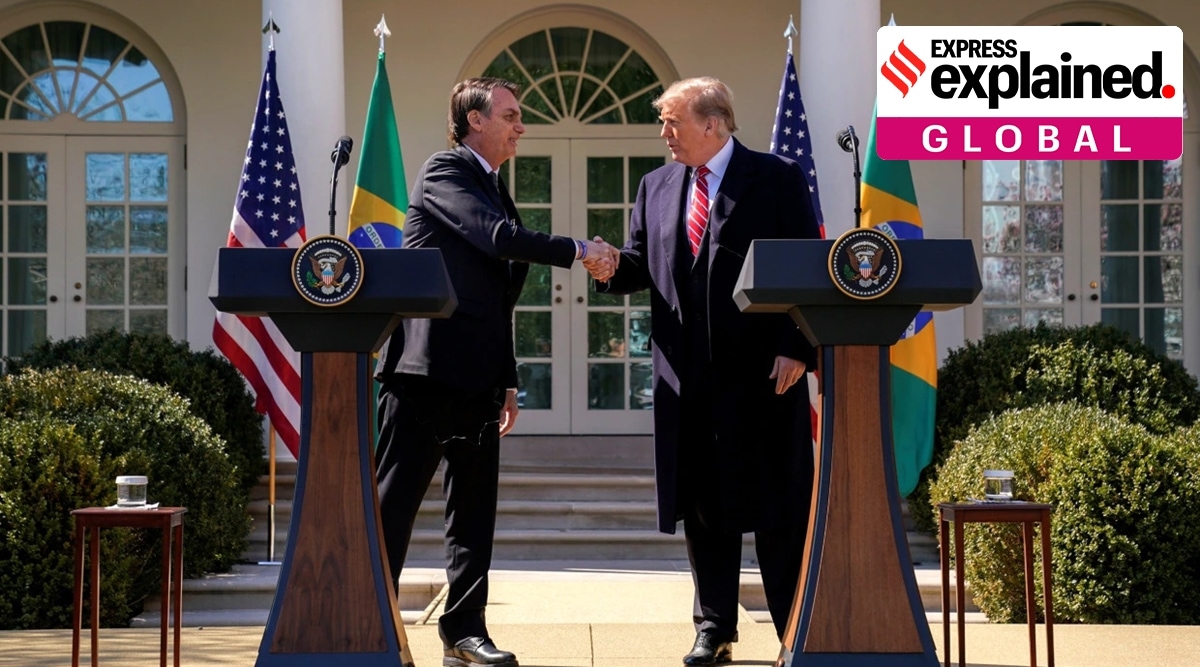Latest Comment
Post Comment
Read Comments
 Trump (right) and Bolsonaro have openly expressed support and admiration for each other, with Trump even urging Brazilians to vote for the “Trump of the Tropics,” as Bolsonaro is often called, during the 2022 elections. (Reuters/Kevin Lamarque)
Trump (right) and Bolsonaro have openly expressed support and admiration for each other, with Trump even urging Brazilians to vote for the “Trump of the Tropics,” as Bolsonaro is often called, during the 2022 elections. (Reuters/Kevin Lamarque) On January 8, supporters of former Brazilian president Jair Bolsonaro stormed and ransacked important government buildings in Brasilia, including the country’s Congress, the Presidential Palace and the Supreme Court. In scenes reminiscent of the January 6, 2021 insurrection in Washington DC, Bolsonarists demanded that the result of the presidential election of October 2022 be overturned.
The uprising, lasted a little more than three hours. President Luiz Inacio Lula da Silva has vowed to “punish” the wrongdoers and has blamed Bolsonaro, currently living in Florida and yet to officially concede defeat, for inflaming his supporters with false rhetoric on election fraud.
Bolsanaro and Trump are among the rightwing populist leaders who have come to power in several countries by harnessing popular anti-establishment sentiment through intense anti-globalist and anti-minority rhetoric, and who have subsequently gone on to attack and subvert a range of democratic institutions in their countries.
Trump and Bolsonaro have openly expressed support and admiration for each other, and Trump has earlier urged Brazilians to vote for the “Trump of the Tropics,” as Bolsonaro is often called.
The events in Brazil on January 8 were a near-replay of what happened at the United States Capitol two years ago. In both cases, angry supporters of a president who had been defeated in an election — unfairly, they believed — stormed government buildings with the intention of “taking back” their country. In both cases, they were egged on by their leaders — Trump and Bolsonaro — with baseless claims of election fraud.
In a speech on December 2, 2020, Trump said, “If we don’t root out the fraud, the tremendous and horrible fraud that’s taken place in our 2020 election, we don’t have a country anymore.”
Two years later, Bolsonaro’s son used almost identical language, claiming that his father was the victim of “the greatest electoral fraud ever seen”.
Both claims were debunked by authorities and the media in the two countries. But the claims of the leaders and their repeated parroting by their diehard followers was “proof” enough for many. Social media was used to spread disinformation and to organise demonstrations and protests against the “stolen elections”.
The parallels between the uprisings in Washington DC and Brasilia are not coincidental. Rather, they are a part of a common playbook that rightwing populists have used to exploit anti-institutional anger and ultra-nationalist urges.
Thomas Traumann, a Rio-based political expert, told The Guardian: “Trump is his (Bolsonaro’s) idol and his model. And what did Trump do? He contested, he didn’t accept defeat, he called people on to the streets and encouraged violent protests and left power without backing down and continued to engage his followers so they didn’t recognize the authority of the new government and thus kept his base fired up. This, for me, is Bolsonaro’s roadmap.”
Brian Winter, a Brazil specialist, told The Guardian that Bolsonaro’s tactic of questioning the elections after he lost was “100 percent Trump inspired”.
“They (Bolsonarists) have noticed that January 6 and Trump’s continuous denial of the election has not cost him his future – as a matter of fact it may have saved it. Because this image of invincibility is so important to both of these movements – and the only way that Donald Trump could lose and survive was by insisting that he didn’t lose,” Winter said.
It takes years of undermining rhetoric and action to persuade almost half the population of a country to begin doubting the sanctity of its democratic elections and institutions.
The attack on “Washington elites” and vows to “drain the swamp” became central to Trump’s rhetoric in 2015-16 as he launched his election campaign. Bolsonaro came to power after Brazil was rocked by corruption scandals and a crippling recession, and he promised to “clean things up”.
Both men promised to deregulate businesses and reduce taxes, they sought to dismantle environment protection frameworks in their countries, and pushed unscientific and dangerous public policy responses to the Covid-19 pandemic.
They exploited racial tensions and nativist insecurities to push their agendas. Importantly, both Trump and Bolsonaro expressed vocal opposition to “political correctness”, and engaged in openly racist, misogynistic, and homophobic messaging to pander to their base.
The rise of leaders like Trump and Bolsonaro – also Viktor Orban of Hungary, Marine Le Pen of France, Geert Wilders of the Netherlands – has been situated in the context of growing wealth inequalities and changing racial and gender dynamics that have put people’s lives and identities in flux and engendered widespread insecurities. Right wing populism is a direct outcome of this, and grows by channelling people’s fears and frustrations.
Philosopher and political scientist Noam Chomsky said in an interview that right wing populism is a manifestation of the “general collapse of the centrist political institutions during the neoliberal period.”
He said, “What is taking place is reminiscent of Gramsci’s observations about an earlier period, ‘when the old is dying and the new cannot be born’; in this interregnum a great variety of morbid symptoms appear.”